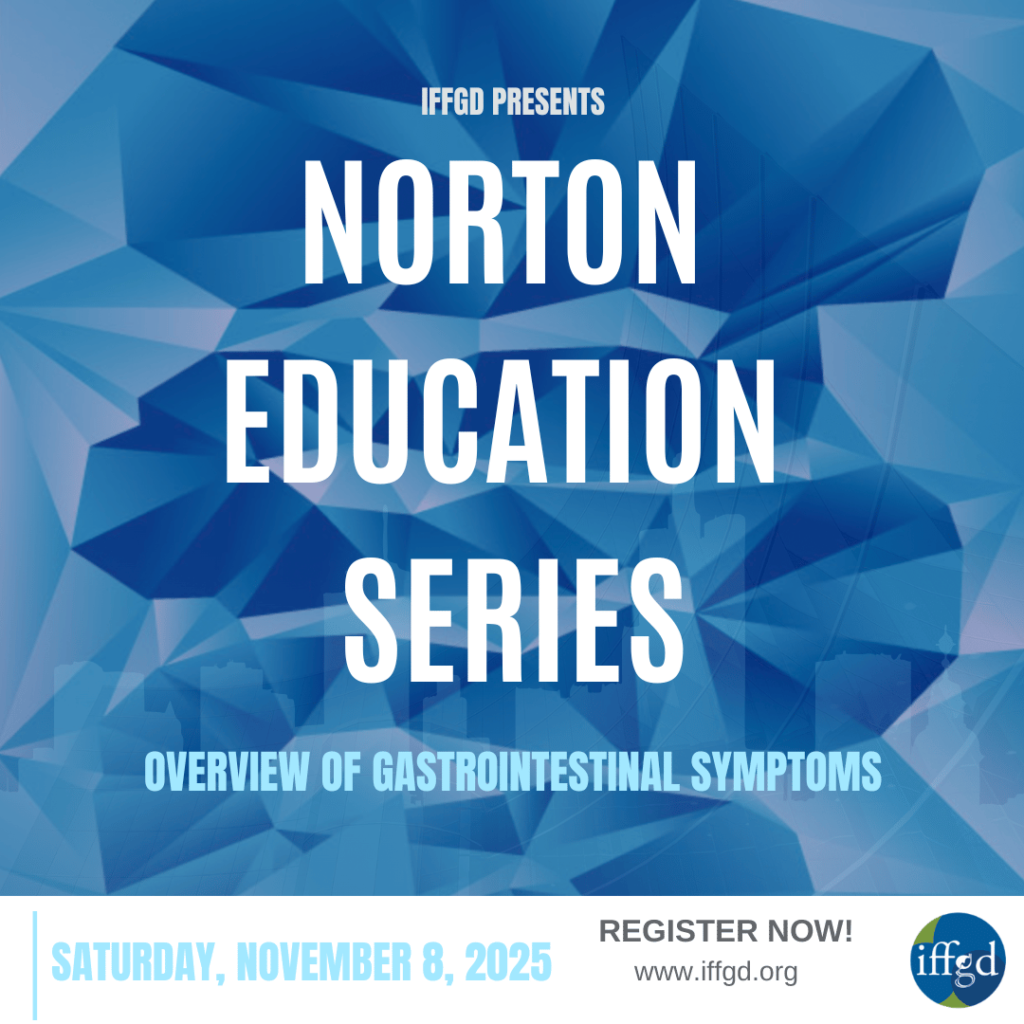2025 NES: Overview of GI Symptoms
Program Committee Chairs: Dr. Brad Kuo & Dr. Kyle Staller
In collaboration with: healthcare providers from Harvard Medical School and Massachusetts General Hospital
Date: Saturday, November 8, 2025
Meeting Location: Virtual
This page is updated regularly. Check back daily for the latest information.
Program Overview
The International Foundation for Gastrointestinal Disorders (IFFGD), in collaboration with Harvard Medical School, presents a complimentary edition of the Norton Education Series (NES): “Overview of GI Symptoms.” This program is designed to empower patients with the knowledge and tools they need to manage their health effectively.
What to Expect:
Comprehensive Coverage: Delve into the overview of GI symptoms with 22 expert-led talks addressing upper, middle, and lower GI tract symptoms, as well as identifying alarm symptoms.
Expert Leadership: Gain insights from Dr. Brad Kuo and Dr. Kyle Staller, the Program Committee Chairs and esteemed gastroenterologists at Massachusetts General Hospital.
Accessible Learning: The entire program is available for free on IFFGD’s YouTube channel, allowing you to learn at your own pace from the comfort of your home.
This initiative is part of IFFGD’s mission to provide patient-centered education, aiming to reduce healthcare utilization and enhance long-term health outcomes for individuals with chronic GI conditions.
Program and Presenter Details
Session 1: Upper GI Symptoms
Upper GI Pain

Kristina F. Skarbinski has been a nurse practitioner in the Gastroenterology Department at Massachusetts General Hospital since 2014, after graduating from Simmons University. She specializes in disorders of gut-brain interaction (DGBI), with a focus on upper GI and swallowing disorders. Kristina serves as the Clinical Lead APP in both the Swallowing, Heartburn, and Esophageal Disease (SHED) Center and the Neurointestinal/Motility Health Center, providing expert care across GI and GI Surgery. She is active in research, education, and APP onboarding, has published and presented nationally, and is a committee member with GHAPP and ACG.
Heartburn and Acid Reflux

In this video, I provide an overview of gastroesophageal reflux disease (GERD) and related conditions. GERD is a common disorder where stomach acid frequently flows back into the esophagus, leading to symptoms such as heartburn, regurgitation, chest discomfort, and difficulty swallowing. It is important to recognize that not all heartburn is caused by GERD, and other conditions can mimic its symptoms. I also discussed common causes of reflux, including trigger foods and overeating, and emphasized the long-term risks of untreated acid reflux, such as esophageal damage and impaired quality of life. The goal of this video is to empower patients to better understand their symptoms, possible causes, and the importance of working with their healthcare team to find effective treatment.
I am Muhammad Hashim Hayat, MD, a second-year Gastroenterology Fellow at Brigham and Women’s Hospital. My clinical and research interests focus on gastroesophageal reflux disease (GERD), esophageal disorders, and motility abnormalities. Through my work, I strive to improve both the diagnosis and management of these conditions while empowering patients through education. I am committed to advancing understanding of reflux and esophageal disease so that people can take a proactive role in their digestive health.
Difficulty Swallowing

Are you experiencing difficulty swallowing? This talk can help! You will learn how swallowing works, and what causes swallowing problems. We will review tests your doctors may order, and treatments they may offer. We will discuss how to talk to your doctor about your symptoms, including questions that you should answer. Finally, we will cover how to identify a swallowing emergency, and when you should go to the emergency room.
Wai-Kit Lo, MD, MPH, AGAF, FACG
Co-Director, Clinical Motility Service, VA Boston Healthcare System Associate Director, Center for Gastrointestinal Motility, Brigham and Women’s Hospital Assistant Professor, Harvard Medical School
Dr. Lo received his M.D. from Harvard Medical School, and M.P.H. from Harvard Chan School of Public Health as part of his gastroenterology fellowship training at Brigham and Women’s Hospital, and completed his internal medicine residency at Massachusetts General Hospital. Currently, he holds dual faculty appointments with VA Boston Healthcare and Brigham and Women’s Hospital, with a clinical focus on esophageal disease and gastrointestinal motility. His clinical research is in the impact of GERD on lung transplant outcomes, and as a result, has worked closely on protocols to optimize peri-transplant reflux evaluation and management. He is a fellow of the American College of Gastroenterology and the American Gastroenterological Association, and has contributed to original research publications in the New England Journal of Medicine, Clinical Gastroenterology and Hepatology, American Journal of Gastroenterology, Gastrointestinal Endoscopy, and Journal of Heart and Lung Transplantation on various topics including gastroesophageal reflux disease, small intestinal bacterial overgrowth, eosinophilic esophagitis, and artificial intelligence. He also serves on several national committees including the American College of Gastroenterology Practice Parameters Committee, and chairs the national VA Field Advisory Board GI Telehealth Subcommittee, where he is working to improve nation-wide VA telehealth access to motility testing.
Nausea and Vomiting

Have you ever struggled with nausea or vomiting and wondered what’s really going on? This talk breaks it down in clear, simple terms – what these symptoms mean, the most common causes, when they could signal something more serious, and how to recognize red flags that need urgent care. You’ll also learn practical tips to feel better at home, how to track your symptoms effectively, and what tests or treatments your doctor might recommend. By the end, you’ll feel more confident talking with your healthcare provider and taking charge of your health.
Originally from Miami, Florida, Dr. Jenna Dimino studied Biomedical Sciences and Italian Studies at the University of Central Florida Burnett Honors College (2010-2014) and attended the University of Miami Miller School of Medicine (2014-2018) before transitioning to the northeast to continue her medical training. She completed Internal Medicine internship and residency at Mount Auburn Hospital (2018-2021) in Cambridge, Massachusetts, where she founded a Fellowship Training Pathway and Resident Wellness Committee. She went on to pursue a fellowship in Gastroenterology and Hepatobiliary Diseases at the New York Medical College – Metropolitan Hospital Program (2021-2024) in New York, New York, where she served as Chief Fellow. Dr. Dimino spearheaded the reinvigoration of the hospital’s esophageal motility lab, becoming the referral center for swallowing disorders and preoperative workup in the NYC Health and Hospitals system. During that time, she also served as the fellowship Wellness Chief and mentored residents preparing and applying for various fellowships. Dr. Dimino completed additional training as a Clinical and Research Neurogastroenterology and Motility Fellow in the Division of Gastroenterology at the Massachusetts General Hospital and served as a Lecturer at Harvard Medical School. Dr. Dimino is starting her career as a Neurogastroenterology and Motility specialist and clinical faculty at Stanford University. Her interests include providing high quality culturally sensitive neurogastrointestinal care to patients of diverse backgrounds, teaching and mentoring trainees of all levels in clinical, research, and fellowship pursuits, and promoting wellness.
Early Satiation

Early satiation is the symptom of stomach fullness that occurs after a smaller amount of a meal, stopping one from finishing the full meal. It is a common symptom in many gastrointestinal diseases and therefore does not predict the underlying diagnosis. In this video, we will review potential causes, what key points to discuss with a medical provider, and what testing and treatments one may receive depending on the clinical situation and the ultimate diagnosis outcome.
Dr. Brian Surjanhata, MD is a gastroenterologist at the Center for Neurointestinal Health within the Division of Gastroenterology at Massachusetts General Hospital and an Instructor in Medicine at Harvard Medical School. He obtained is Medical Degree from Wayne State University School of Medicine, Internal Medicine and general Gastroenterology training at Boston Medical Center affiliated with Boston University School of Medicine and completed the advanced fellowship in Neurogastroenterology and Motility at Massachusetts General Hospital affiliated with Harvard Medical School. He sees all patients with complex gastrointestinal motility disorders and disorders of gut-brain interaction but has specific clinical and research interests in Gastroparesis, Functional Dyspepsia, and Constipation as well as the gastrointestinal dysmotility overlap in Parkinson’s Disease and Systemic Amyloidosis conditions. He has published research in evaluating the physiology of gastric, small bowel, and colonic motility and contractility using non-invasive wireless motility capsule to discern how specific dysmotility findings relate to symptom and disease evolution and how it may impact clinical management.
Bloating and Distension

Bloating is one of the most common — and misunderstood — digestive symptoms. While often blamed on excess gas, it can result from changes in gut motility, sensitivity, bacterial activity, or even muscle coordination. In my talk, I’ll explore how the brain and body interact in these sensations — focusing on abdominophrenic dyssynergia and the viscerosomatic reflex, where miscommunication between the gut, diaphragm, and abdominal wall can literally change the body’s shape and amplify discomfort. Understanding these mechanisms reshapes how we think about — and treat — bloating
Dr. Nir Bar is a gastroenterologist and faculty member at Massachusetts General Hospital and Harvard Medical School, specializing in neurogastroenterology and gastrointestinal motility. He completed his advanced fellowship at MGH following residency and fellowship training at Tel Aviv Sourasky Medical Center, where he later directed the Neurogastroenterology Service before joining as faculty at the Massachusetts General Hospital. His clinical and research work focus on disorders of gut–brain interaction, esophageal and anorectal motility. Dr. Bar is actively involved in international collaborations and teaching, including the Harvard Motility Course, and has published numerous studies on the physiology and treatment of functional gastrointestinal disorders.
Belching

Belching, commonly known as burping, is a normal way our body releases air. But when it occurs too often or interferes with daily life, it could signal a digestive problem. This presentation explains the two main types of belching: gastric belching, which happens when swallowed air exits the stomach, and supragastric belching, where air never actually reaches the stomach. Some causes include diet, acid reflux, anxiety, or simply swallowing too much air. Treatments range from avoiding carbonated drinks to breathing exercises and therapy. If belching is frequent or bothersome, it is important to talk openly with your doctor.
Jennifer X. Cai, M.D., M.P.H.
Dr. Jennifer Cai serves as the Associate Director of the Gastrointestinal Motility and Physiology Lab at Brigham and Women’s Hospital and specializes in seeing patients with GI motility and neurogastroenterology disorders. She is also involved as a faculty preceptor in the Advanced Clinical Elective in Women’s Health at Harvard Medical School. Her research focuses on esophageal disease, specifically extraintestinal manifestations of GERD, including laryngopharyngeal reflux disease and cardiac arrythmias. Dr. Cai was the recipient of the American Neurogastroenterology and Motility Society Young Investigator Award and has been selected to the American College of Gastroenterology Young Physician Leadership Scholars Program.
What Can I Eat? Dietary Options (FODMAP)

Wondering what you might be able to eat without triggering symptoms? Tune into this short video where we will explore how to follow the low FODMAP diet in a healthful and balanced manner! Although this video may be helpful, it is not a substitute for dietitian advice! Studies show that the low FODMAP diet is most helpful when patients are seeing a GI-trained dietitian. Check out the IFFGD website to explore dietitians in your area!
I blend my love of food and science to help clients nourish themselves and build a balanced relationship with food. My expertise in GI disorders and eating disorders shapes thoughtful, personalized care.
Does My Gut Age?

This presentation reviews how the gastrointestinal tract changes with age, the symptoms that may arise, and the lifestyle and environmental factors that influence gut health. It also highlights practical strategies to support digestion and promote healthy aging.
Dr. Madeline Berschback is a gastroenterology fellow at Massachusetts General Hospital, where she is also completing an advanced fellowship in gastrointestinal motility and functional GI disorders. She earned her medical degree from Wayne State University and completed her Internal Medicine residency at Massachusetts General Hospital. Her research focuses on the intersection of functional gastrointestinal disorders, eating behaviors, and nutrition, with the aim of advancing patient-centered care.
Women’s Health in GI

Women are disproportionately affected by disorders of brain-gut interaction such as irritable bowel syndrome, but little is known why. In this discussion, I discuss the unique hormonal fluctuations and its influence on your gastrointestinal tract including the cycles of your period, perimenopause as well as menopause. Also, I discuss important diagnoses women know about, including endometriosis and pelvic floor dysfunction that can influence chronic symptoms of abdominal pain, diarrhea, constipation and more.
Dr. Judy Nee is assistant professor at Harvard Medical School. She serves as the Director of the IBS and GI Motility Center at BIDMC Boston. Her clinical and research interests are related to irritable bowel syndrome and women’s GI health and disease.
Constipation

This presentation helps you understand what constipation is, why it happens, and how to manage it. You’ll learn about common symptoms (like infrequent or hard bowel movements), possible causes, and when it’s time to see your healthcare provider. It also covers helpful tips — from diet and exercise to simple toilet positioning and therapy options. Both medication and non-medication treatments are explained, so you can feel more in control and know what to expect during your healthcare visit. Constipation is a common and treatable condition, and this information is designed to help you take the next steps toward relief and better digestive health.
Samantha Calabrese is a board-certified Adult-Gerontology Primary Care Nurse Practitioner with advanced training in gastrointestinal (GI) motility and neurointestinal health. She currently practices at Massachusetts General Hospital (MGH) in the Gastroenterology Department, specializing in complex conditions such as irritable bowel syndrome (IBS), gastroparesis, functional dyspepsia, and other disorders of gut-brain interaction (DGBIs). She is also trained in Cognitive Behavioral Therapy (CBT) for IBS and actively supports patients with disordered eating and GI overlap conditions.
In addition to her clinical role, Samantha is involved in teaching and research, serving as a peer reviewer for The Nurse Practitioner Journal, a course director and speaker for national GI education programs, and a published author in gastroenterology journals.
Samantha is dedicated to improving patient outcomes through education, advocacy, and a multidisciplinary approach to care.
Diarrhea

In this presentation, Dr. Stephanie Owyang explains the different types of diarrhea, including disordered motility, osmotic, inflammatory, secretory, and overflow diarrhea. She also offers guidance on how to discuss your symptoms with your healthcare provider and ways to maintain proper hydration.
Dr. Stephanie Owyang is a gastroenterologist at Brigham and Women’s Hospital in Boston. She specializes in diagnosing and treating conditions affecting the esophagus, stomach, and intestines, including swallowing disorders and inflammatory bowel disease.
Changes in Stool Appearance

In this presentation, Dr. Vikram Rangan explains common causes of changes in stool appearance. While most changes are harmless, certain patterns may signal a more serious issue and should be evaluated by a healthcare professional.
Vikram Rangan, MD, is a gastroenterologist at Beth Israel Deaconess Medical Center and an Assistant Professor of Medicine at Harvard Medical School. His clinical work focuses on neurogastroenterology, including motility and swallowing disorders.
Bowel Urgency-Gastro Colic Reflux

Fecal urgency affects a large number of people. But did you know that there are certain instances where this actually makes sense. In this presentation, we will discuss how the body moves food and stool forward via a process called the gastro-colic reflex. We will also discuss what makes fecal urgency normal or abnormal, as well as how to approach a visit to the doctor to discuss this problem (don’t worry, we aren’t embarrassed by it). Finally, we will explain to you what can cause abnormal fecal urgency and how it might be treated. Tune in, your colon may just thank you for it later.
Dr. Alex Goldowsky is a gastroenterologist at Beth Israel Deaconess Medical Center and Instructor of Medicine at Harvard Medical School. He directs the Center for LGBTQIA+ Digestive Health and is a founding member of Rainbows in Gastro. His work focuses on functional GI disorders, disorders of gut-brain interaction such as IBS, and advancing digestive health in the LGBTQIA+ community. A dedicated educator and advocate, he has published in leading journals and presented at national and international conferences.
Incontinence

Fecal incontinence is the accidental loss of stool, which can be embarrassing and difficult to talk about—but you’re not alone, and help is available. It can be caused by problems with the muscles or nerves around the anus, diarrhea, constipation, or other medical conditions. Treatment depends on the cause and may include dietary changes, medications, pelvic floor exercises, or procedures to strengthen control. The most important first step is to speak with your doctor. Together, you can find a plan that works for you and helps you regain confidence and quality of life.
Chethan Ramprasad MD MS is a gastroenterologist with expertise in esophageal disease and gastrointestinal motility. He is an attending physician at Beth Israel Deaconess Medical Center and teaches medical students, residents, and fellows as a faculty member of Harvard Medical School.
Flatulence

This presentation provides a clinical overview of flatulence including the physiology of intestinal gas, common dietary and behavioral contributors, and the distinction between normal and excessive gas symptoms. It also reviews alarm features that may warrant further evaluation and outlines evidence-based strategies for diagnosis and management.
Dr. Lawrence Borges is Chief of Gastroenterology at Mount Auburn Hospital and an Instructor in Medicine at Harvard Medical School. His clinical practice focuses on general gastroenterology with subspecialty expertise in esophageal disease, including advanced diagnostic testing for reflux and motility disorders. Since joining Mount Auburn in 2018, he has revitalized the GI Motility Lab, launched a GI-Oncology Multidisciplinary Navigation Program, and advanced colorectal cancer screening initiatives across the Beth Israel Lahey Health system. Dr. Borges is also deeply committed to medical education, teaching and mentoring Harvard medical students and internal medicine residents in endoscopy, consultative care, and quality improvement.
Anal Lumps and Bumps

In this presentation, Dr. Christopher Velez addresses a topic many patients find difficult to discuss: anal lumps and bumps. He reviews how perianal dermatoses are evaluated, diagnosed, and treated, and provides examples of inflammatory, infectious, and sexually transmitted conditions that can appear in this area.
Christopher Velez, MD, is a gastroenterologist at Massachusetts General Hospital specializing in neurogastroenterology and motility disorders of the esophagus, stomach, and bowels. He works closely with the Swallowing, Heartburn, and Esophageal Disease Center and also provides GI care within the Adult Cystic Fibrosis Clinic. Dr. Velez is committed to improving access to culturally competent care in underserved communities and is actively involved in teaching and fellowship training at MGH.
Blood in Bowel Movements

This presentation will address the topic of blood in stool, offering a patient-friendly overview of its potential causes, evaluation, and next steps. The talk will explain how gastrointestinal bleeding can appear in different forms, when it may signal a medical emergency, and what diagnostic tests are commonly used. Using clear language and visual aids, the session aims to help patients understand when to seek care, what to expect during evaluation, and how early detection can improve outcomes.
Ingrid Guerrero-Lopez is a medical student at Universidad Europea de Madrid, Spain, with a dedicated focus on gastrointestinal motility research. Since 2020, she has been working in Dr. Braden Kuo’s laboratory at Massachusetts General Hospital, Boston, contributing to studies on functional dyspepsia, gastroparesis, and other motility disorders. Her work has been showcased through poster and oral presentations at national scientific meetings. In addition to her research, Ingrid has applied her skills in medical illustration, creating figures for book chapters and peer-reviewed publications.
Low Blood Counts (Anemia)

This session will help you understand what it means to have a low red blood cell count, also known as anemia, and why it’s important not to ignore this “alarm sign.” We’ll explain what red blood cells do, the different reasons you might become anemic, and how anemia can sometimes point to hidden problems in the digestive system, like slow bleeding or even colon cancer. You’ll learn about common symptoms of anemia, when you should talk to your provider, and what questions to ask to make sure you get the care you need. By understanding these signs and being prepared to track your symptoms, you can play an active role in protecting your health.
Dr. Ryan Flanagan is a clinician educator in the Division of Gastroenterology, Hepatology, and Endoscopy at the Brigham and Women’s Hospital. His major clinical focus has been on the care of inpatients as a GI hospitalist, with expertise in GI bleeding, enteral access, and acute GI diseases. He also practices general gastroenterology and motility in the outpatient setting. He teaches medical students in the Integrated Human Pathophysiology I GI course and is core faculty for Clinical Skills Assessment in the HMS Program in Medical Education (PME). As the Associate Program Director for the Gastroenterology Fellowship Program at BWH, he is deeply invested in training the next generation of gastroenterologists. His major academic focus has been on the improvement of teaching methods in gastroenterology, specifically related to endoscopy teaching. His goal is to enhance curriculum design for gastroenterology teaching at all levels of medical education and to improve knowledge and skill acquisition in this rapidly evolving field.
New Onset of Symptoms After 50

In this talk, Dr. Liu discusses the concept of alarm symptoms and their clinical significance. She highlights why the age at symptom onset is important and offers practical tips for patients on how to communicate gastrointestinal symptoms effectively with their healthcare providers.
Dr. Rebecca Liu earned her MD/PhD from Yale School of Medicine and is currently a Gastroenterology Fellow at Massachusetts General Hospital and Harvard Medical School. Her clinical and research interests focus on neurogastroenterology, particularly disorders of gut-brain interactions and gastrointestinal motility disorders.
Unintended Weight Loss

This presentation reviews unintentional weight loss. While many patients may be trying to lose weight, weight loss without effort is abnormal. The presentation will review the definition of unintentional weight loss, common causes, when to seek help, and what to expect from evaluation by your physician.
Kelly Buchanan is a second-year fellow in Gastroenterology and Hepatology at Massachusetts General Hospital. She graduated from Duke University School of Medicine, where she also completed a HHMI Fellowship studying gut-brain neurobiology. She completed her residency in internal medicine at Massachusetts General Hospital, where she also served as a Chief Resident for the program.
Diarrhea that Wakes You Up

In this short video about diarrhea that wakes people up at night, I discuss the symptoms and provide a basic framework for thinking about different types of diarrhea, which gives us inisght into what makes nocturnal diarrhea unique. I then cover the initial evaluation, treatment options, and common questions patients often ask. Finally, I share practical tips on what to do, what to tell your doctor during a clinic visit, and which warning signs should prompt seeking medical advice.

